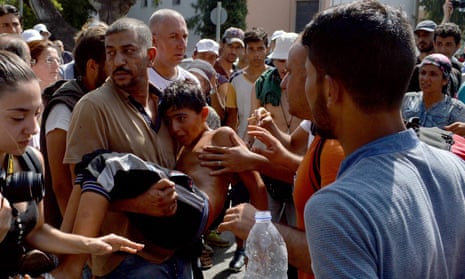Lesbos is on the verge of ‘explosion’, the Greek immigration ministry has said, as the island struggles to cope with the influx of thousands of refugees, mostly from Syria.
Yiannis Mouzalas told To Vima radio that boats taking refugees to the Greek mainland - the start point of a land route to Germany through Macedonia, Serbia and Hungary - would soon be using a second port to ease pressure on the island of 85,000 inhabitants.
“Mytilene [the capital of Lesbos] currently has 15,000 to 17,000 refugees and this is the official figure from all services,” Mouzalas, a junior interior minister, said. “We are placing emphasis here because the situation is on the verge of explosion.”
Greek television on Monday night reported scenes of chaos with as many as 6,000 refugees crowding the island’s port to board the Eleftherios Venizelos, a cruiseliner pressed into action to transport newcomers to the mainland. The surge was such that the ferry was forced to raise its gangplanks after it had docked.
Athens’ caretaker government, which has made handling of the crisis its top priority ahead of general elections on 20 September, said it was also stepping up emergency aid, dispatching doctors and medical units to the island. In a bid to defuse tensions, the migration minister Yiannis Mouzalas also announced urgent measures, including the deployment of 60 coastguard officials and police from Athens to expedite the processing of refugees.
A physician with the international charity Doctors of the World, Mouzalas said conscripts had similarly been ordered to bake and distribute 1,500 loaves of bread to feed the crowds. But he conceded that security services were aware that a “small number” were likely to be Jihadis. “It would be foolish for anyone to deny [that],” he told Star TV adding that a lot of European-born Jihadis were also going the other way.
Lesbos is one of several Greek islands struggling with the arrival of thousands of refugees from nearby Turkey. The picture of a three-year-old Syrian boy, Aylan Kurdi, who drowned along with his mother Rehan and his five-year-old brother Ghalib off the Turkish coast, has put pressure on European governments to deal with the gravest refugee crisis the continent has faced since the second world war.
“We hope that in the next five days the islanders and the refugees will see clear signs of improvement,” Mouzalas said.
There have been clashes between police and new arrivals, and between refugees of different nationalities, over delays in the registration process that have held up their journeys on to other European countries. Syrians have been granted priority, sparking tensions with others forced to wait.
In July alone, 50,242 refugees and migrants arrived in Greece, significantly more that the figure 43,500 for the whole of 2014, according to the UN refugee agency (UNHCR). More than 200,000 people have arrived in Greece from Turkey so far in 2015.
Greece has received substantial support from the EU’s refugee fund, but has failed to provide adequate reception facilities, according to experts from the Centre for European Policy Studies.
On the Greek mainland, about 2,000 people gathered just before dawn on Monday at the border near the village of Idomeni, attempting to cross into Macedonia. By midday, about 1,000 had done so, and there were scuffles between Macedonian police and some of those trying to head north.
On Serbia’s border with Hungary, several hundred Arabs, Asians and Africans tired of waiting for buses broke through police lines and walked north on the main road to Budapest.
Police repeatedly tried to form lines blocking roads around a holding centre near the border village of Röszke, but the crowd vastly outnumbered them and raced through fields to reach the M5 motorway linking Hungary to Serbia.
Germany expects at least 10,000 more refugees to arrive on Monday, according to Christoph Hillenbrand, the district president of Upper Bavaria, after receiving 20,000 at the weekend.
Two Italian navy ships have brought 60 bodies ashore in Sicily from a shipwreck in April in which as many as 800 people died. The navy said their recovery brought the number of bodies its divers and robots had found to 118.
Prosecutors who viewed film taken by divers of the boat’s interior said the images support testimony from the few survivors that about 800 people were aboard when the vessel capsized as rescuers approached, with hundreds trapped in the hold.
Italy’s coast guard was also searching the waters between Libya and Sicily after 107 survivors rescued from an overcrowded dinghy told authorities about 20 people had fallen overboard and their smugglers would not stop to pick them up.
